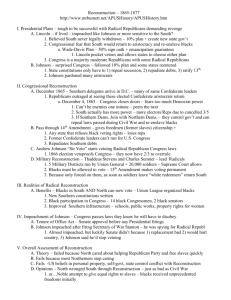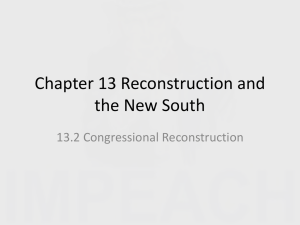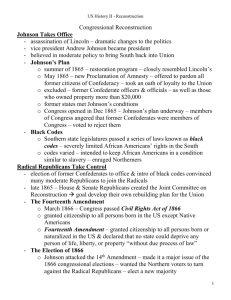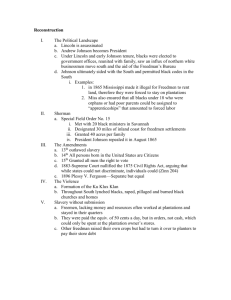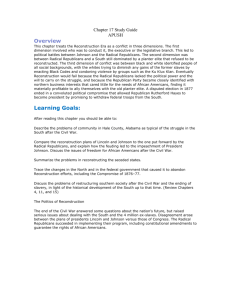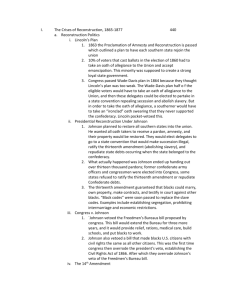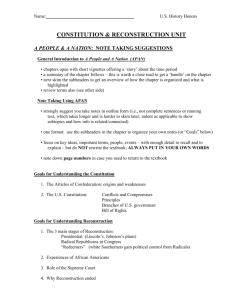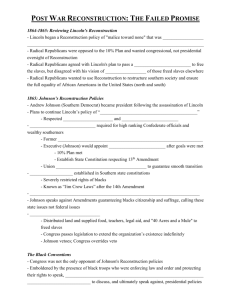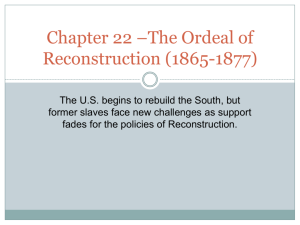Reconstruction
advertisement
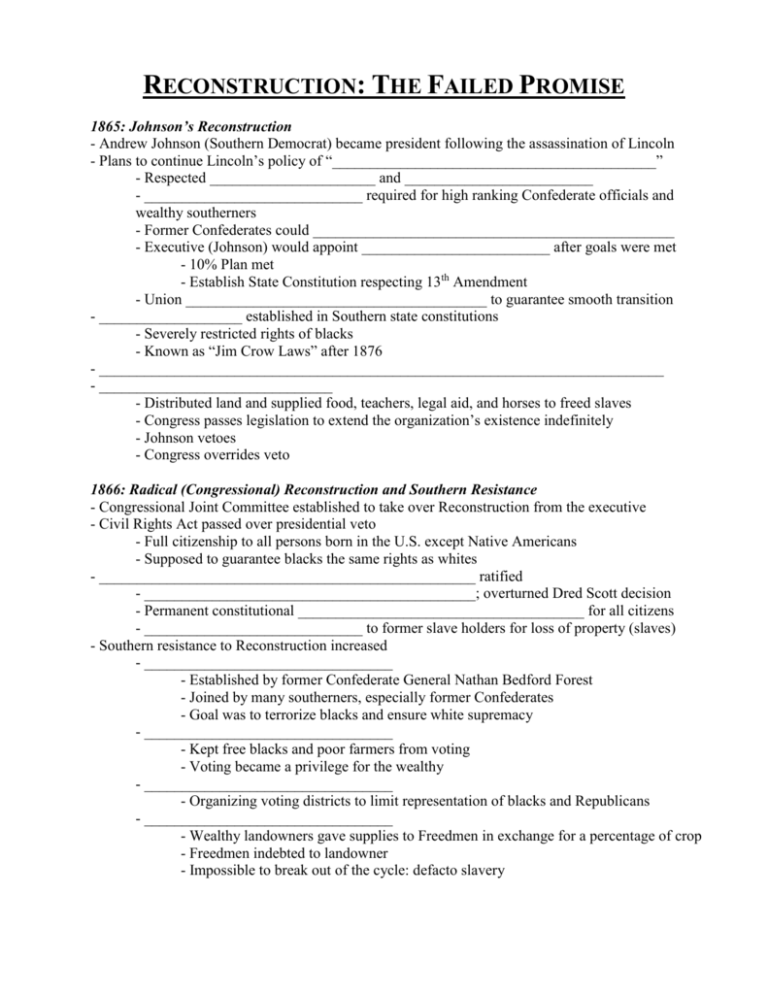
RECONSTRUCTION: THE FAILED PROMISE 1865: Johnson’s Reconstruction - Andrew Johnson (Southern Democrat) became president following the assassination of Lincoln - Plans to continue Lincoln’s policy of “___________________________________________” - Respected ______________________ and _________________________ - _____________________________ required for high ranking Confederate officials and wealthy southerners - Former Confederates could ________________________________________________ - Executive (Johnson) would appoint _________________________ after goals were met - 10% Plan met - Establish State Constitution respecting 13th Amendment - Union ________________________________________ to guarantee smooth transition - ___________________ established in Southern state constitutions - Severely restricted rights of blacks - Known as “Jim Crow Laws” after 1876 - ___________________________________________________________________________ - _______________________________ - Distributed land and supplied food, teachers, legal aid, and horses to freed slaves - Congress passes legislation to extend the organization’s existence indefinitely - Johnson vetoes - Congress overrides veto 1866: Radical (Congressional) Reconstruction and Southern Resistance - Congressional Joint Committee established to take over Reconstruction from the executive - Civil Rights Act passed over presidential veto - Full citizenship to all persons born in the U.S. except Native Americans - Supposed to guarantee blacks the same rights as whites - __________________________________________________ ratified - ____________________________________________; overturned Dred Scott decision - Permanent constitutional ______________________________________ for all citizens - _____________________________ to former slave holders for loss of property (slaves) - Southern resistance to Reconstruction increased - _________________________________ - Established by former Confederate General Nathan Bedford Forest - Joined by many southerners, especially former Confederates - Goal was to terrorize blacks and ensure white supremacy - _________________________________ - Kept free blacks and poor farmers from voting - Voting became a privilege for the wealthy - _________________________________ - Organizing voting districts to limit representation of blacks and Republicans - _________________________________ - Wealthy landowners gave supplies to Freedmen in exchange for a percentage of crop - Freedmen indebted to landowner - Impossible to break out of the cycle: defacto slavery 1867: The Radical Republicans Formalize Control - ____________________________________ - ________________________ held advantage in Congress - Senate: 42 Republicans, 11 Democrats - House: 143 Republicans, 49 Democrats - Could ___________________________________ (requires a 2/3 majority of Congress) - _________________________________________________ - South divided into ___________________________ (except TN which had ratified the 14th and was readmitted) - New qualifications for reentry of states established - New Constitutional Convention had to be called; no ex-Confederates allowed - Had to approve the 14th Amendment - No ex-Confederates could vote without a Congressional pardon - Johnson Impeachment (1st Attempt) - Fall 1867 - House Judiciary Committee brought a bill of impeachment against Johnson - Charges were not legal arguments so much as they were a list of complaints - Vote for trial failed: 108-57 - _____________________________________________ - ______________________________________________________________________ - Johnson decided to test the act by firing ______________________________________ 1868: Congress v. Andrew Johnson - Can’t we all just get along? - Stanton refused to leave after being dismissed by Johnson - Congress claimed Johnson violated the Tenure of Office Act - Johnson Impeachment (2nd Attempt) - House brought charges of impeachment for ___________________________________ - ____________ whether it was an impeachable offence and if the law was Constitutional - Johnson may not have technically violated the act as Stanton was a Lincoln appointment - Wording of the _________________________________________ on that point - 1926 the Supreme Court ruled the Tenure of Office Act was not Constitutional - ________________________________________ held in Senate - Each time, vote was the same - 35 voted Guilty - 19 voted Not Guilty - ________________________________________________________________ - Guilty verdict would have set a ______________________________: removal of president for political differences not “high crimes or misdemeanors” 1869: From Johnson to Grant - General Ulysses S. Grant (Republican) elected president (1869-1877) - Administration filled with ______________________, especially among his appointees - Grant ___________________________________ against the corrupt official, even after their guilt was firmly established - Grant apparently _______________________________ from the corruption 1870: Protecting New Citizens - ________________________________________ ratified - Right to vote guaranteed to all citizens - ________________________________________ - Violators of 14th and 15th Amendments could be prosecuted - ________________________________________ - Federal government could use troops to protect citizens from terror - Began the downfall of the KKK 1871: The End Of The KKK (for now) - _________________________________________________________ - Lynchers were rarely prosecuted - Prosecutions often failed: ______________________________ - Made it ____________________________________________ - Gave control of lynching trials to the federal government - ________________________________________________________ - Allowed for _____________________________ within federal courts - KKK disappeared until around 1915 1875: Violent Reactions - ____________________________________________ - Widespread terror against - ____________________ - ____________________ (Northern Republicans who went South to work) - ____________________ (Southern Republicans who supported Reconstruction) - Democrats visited Republican political rallies and __________________________ - During riots, “________________” gunned down innocents and political leaders - Turned an 1874 election Republican majority of 30,000 to a Democratic majority of about the same number in 1875 - President ____________________________________; feared being accused of “bayonet rule” - ____________________________________________________________________________ 1876: An Election Ends Reconstruction - Election of 1876 - _____________________________________________________________ - Conflict: - Hayes (Northerner) lost the popular election to Tilden (Southerner) - With 20 electoral votes still to count, __________________________________ - _________________________________________________ (Mississippi Plan) - All votes given to Hayes - Later, votes were tossed out - _________________ was formed to decide: 8 Republicans, 7 Democrats - Compromise of 1876: - ______________________________________ but would not run for reelection - ________________________________________________________________ - Lack of troops meant little protection for African-Americans in South - ________________________________________________________________ - ___________________ - North was tired of Reconstruction anyway; not working out very well

